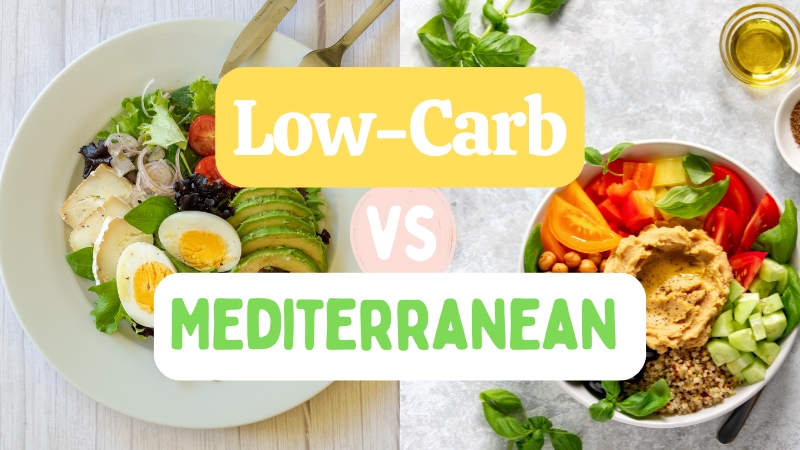If you’re sick of vague answers about “finding what works for you” and “both diets have their merits,” here’s the straight truth: the Mediterranean diet edges out low-carb eating for long-term health, heart protection, and sustainability.
That’s not just hype; recent studies and real-world results back it up. Sure, low-carb diets can melt pounds quickly and tighten blood sugar control for a while.
But when the dust settles and life kicks in, it’s the Mediterranean approach that sticks, it’s more balanced, supports brain and gut health, and lets you enjoy food without constant restriction.
The Quick Rundown
Low-Carb Diet

Low-carb diets are pretty much what they sound like: you cut down on carbs and load up on proteins and fats. Some versions go extreme (think ketogenic diets with less than 50 grams of carbs a day), while others ease up on bread and pasta but don’t ditch them completely.
Common foods:
People often pick this route to lose weight quickly or manage blood sugar swings. But, as with anything, there’s more to it.
Mediterranean Diet
The Mediterranean diet isn’t a “diet” in the restrictive sense, it’s more of a traditional way of eating inspired by places like Italy and Greece. It’s loaded with plants, healthy fats, moderate protein, and yes, carbs, but usually the whole-grain kind.
Common foods:
It’s got a reputation for being heart-friendly and sustainable over time, which is why it’s often recommended for long-term health.
What’s on the Plate?
Here’s a quick look at how the nutrient profiles stack up. Not to bore you with numbers, but it’s helpful to see the contrast.
Nutrient
Low-Carb
Mediterranean
Carbs
5–45% of calories
45–60% of calories
Fats
40–75% (often saturated)
25–35% (mostly unsaturated)
Protein
20–35%
15–20%
Fiber
Often low
High
Variety
Limited (in stricter versions)
Wide range of foods
Now, looking at that, the Mediterranean way has a clear edge when it comes to fiber and variety, which matters more than you might think for things like gut health and keeping meals interesting.
The Real-World Impact: What Do We Know in 2025?

Weight Loss: Fast vs. Steady
Low-carb diets often lead to rapid initial weight loss. This is primarily due to water loss as glycogen is depleted from muscle stores. In the first few weeks, this can result in several pounds lost.
However, when carbohydrate intake resumes, water weight returns, and long-term weight loss tends to stabilize. Studies tracking weight loss beyond one year generally show no significant difference between low-carb and balanced diets.
Mediterranean diets promote weight loss at a slower pace.
The emphasis on fiber from vegetables and whole grains, combined with healthy fats and lean proteins, increases satiety, helping to control calorie intake without rigid tracking.
Long-term adherence is generally easier, which supports consistent weight management over time.
Heart Health: The Full Picture
Low-carb diets, especially those high in saturated fats from butter and red meat, can raise LDL cholesterol levels, even as they improve HDL cholesterol and lower triglycerides. The impact on heart disease risk is inconsistent and varies between individuals.
The Mediterranean diet, with its emphasis on monounsaturated fats (primarily derived from olive oil), high intake of vegetables and legumes, and regular consumption of fish, consistently reduces cardiovascular risk.
It reduces LDL cholesterol, lowers blood pressure, and improves overall cardiovascular markers. Long-term studies continue to favor the Mediterranean diet for heart health.
Blood Sugar Control: Effective but Different
Low-carb diets reduce carbohydrate intake, which directly lowers blood glucose levels and insulin response.
This is especially effective for individuals with type 2 diabetes, often resulting in reduced medication use. However, maintaining a very low-carb intake long-term is challenging.
View this post on Instagram
Mediterranean diets improve insulin sensitivity through a balanced intake of whole grains, legumes, and healthy fats.
Fiber slows carbohydrate absorption, minimizing glucose spikes. While the impact on blood sugar is less immediate compared to low-carb approaches, long-term blood sugar control is often more stable and easier to maintain.
Brain Health and Longevity: Nutrient Density Matters
Mediterranean diets provide antioxidants, polyphenols, and omega-3 fatty acids from diverse plant and seafood sources.
These nutrients support brain function and have been linked to reduced risk of cognitive decline and dementia.
Long-term observational studies reinforce the connection between Mediterranean eating and longevity.
Low-carb diets lack the same breadth of long-term data for brain health. Strict carb restriction can limit intake of fiber, antioxidants, and essential nutrients, which may negatively affect cognitive health over time.
Environmental and Social Impact

Low-carb diets generally rely on higher consumption of animal products, increasing environmental impact due to higher greenhouse gas emissions, water use, and resource demand.
Mediterranean diets prioritize plant-based foods, seafood, and sustainable agricultural practices, resulting in a lower environmental footprint.
Socially, Mediterranean meals are structured around shared eating experiences, making them easier to maintain in family or community settings.
In contrast, low-carb eating often restricts common foods and can be isolating, particularly in social situations where carb-heavy foods are common.
Pros and Cons
Category
Low-Carb Pros
Low-Carb Cons
Mediterranean Pros
Mediterranean Cons
Weight Loss
Rapid at first
Often rebounds
Steady, sustainable
Slower results
Heart Health
Improves some markers
May raise LDL cholesterol
Strong evidence of protection
Needs portion control (olive oil)
Blood Sugar Control
Reduces spikes
Hard to sustain strict carb limits
Balanced glucose management
Carbs still present
Brain Health
Limited data
Potential nutrient gaps
Supports cognition and longevity
None notable
Adherence
Hard to maintain
Socially restrictive
Easy, flavorful, and social
Requires fresh ingredients
Environmental Impact
Higher footprint
Lower footprint
So, Which One Wins in 2025?
Here’s the straight answer: Mediterranean comes out ahead for most people, especially when looking at long-term health, sustainability, and quality of life.
Sure, low-carb diets can work wonders for short-term goals, like kickstarting weight loss or managing blood sugar quickly.
But the Mediterranean approach offers a balanced, practical way to eat for years, not just months.
It’s:
That said, low-carb might be a smart short-term tool for specific needs — for instance, someone trying to reverse prediabetes or drop a few pounds fast. But even then, transitioning to a more balanced approach like the Mediterranean diet makes sense in the long run.
Real-Life Tips to Make It Work

If you’re leaning toward Mediterranean eating:
- Start with one simple change, like swapping butter for olive oil or adding a veggie to every meal.
- Explore whole grains beyond the usual brown rice — try farro, bulgur, or freekeh.
- Keep it flexible. You don’t have to eat fish every day; even a few times a week helps.
If you’re experimenting with low-carb:
- Focus on quality fats (avocado, nuts) rather than loading up on bacon.
- Don’t skimp on non-starchy veggies — they’re your friends for fiber and vitamins.
- Plan for how you’ll eventually reintroduce carbs, ideally from whole, minimally processed sources.
Wrapping It Up
@tastefullylimor Replying to @angelicawines keto diet vs. Mediterranean diet #keto #weightloss #ketodiet #mealprep #fatloss ♬ original sound – tastefullylimor
So, here we are — Mediterranean wins for long-term health and lifestyle in 2025. But the beauty of it all? You’re not locked into one forever.
You can mix elements from both, adjusting as life changes. Maybe you start low-carb to manage blood sugar, then shift toward Mediterranean for balance and enjoyment.
The key? Listen to your body, check in with your healthcare team, and aim for an eating pattern that keeps you energized, healthy, and happy, not just for the next few weeks, but for years to come.
